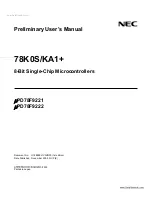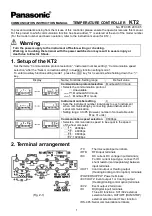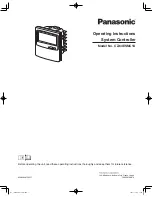
4MELFA-BASIC IV
Detailed explanation of command words
4-170
CmpG (Composition Gain)
[Function]
Specify the softness of robot control.
Note) The available robot types for this instruction are limited. Refer to "[Available robot type]".
[Format]
Cmp Pos, Cmp Tool
Cmp Jnt
[Terminology]
<X to C axis gain>
<J1 to J6 axis gain>
Specify this argument using a constant.
The softness can be set for each axis.
Value 1 .0 indicates the normal status, and the 0.2 is the softest.
If the value is omitted, the current setting value will be applied.
[Reference Program]
1 CmpG , ,0.5, , , , , ' This statement selects only the Z-axis. For axes that are omitted, keep the corre-
sponding entries blank and just enter commas.
[Explanation]
(1) The softness can be designated in each axis units.
(2) The soft state will not be entered unless validated with the Cmp Pos or Cmp Tool commands.
(3) A spring-like force will be generated in proportion to the deviation of the command position and actual
position. CmpG designates that spring constant.
(4) The deviation of the command position and actual position can be read with M_CmpDst. The success/
failure of pin insertion can be checked using this variable.
(5) If a small gain is set, and the soft state is entered with the Cmp Pos, Cmp Tool, and Cmp Jnt commands,
the robot position could drop. Set the softness state gradually while checking it.
(6) The softness can be changed halfway when this command executed under the soft control status.
(7) The gain value of less than 0.2 is invalid. The robot is controlled using the value 0.2.
Also, two or more decimal positions can be set for gain values.
(8) The compliance mode is valid only for the robot arm axes. It is not valid for additional axes (J7, J8 or L1,
L2), even if specified.
[Available robot type]
CmpG[] [<X axis gain>], [<Y axis gain>], [<Z axis gain>], [<A axis gain>],
[<B axis gain>], [<C axis gain>], ,
CmpG[] [<J1 axis gain>], [<J2 axis gain>], [<J3 axis gain>], [<J4 axis gain>],
[<J5 axis gain>], [<J6 axis gain>], ,
RV-6SD/6SDL/12SD/12SDL series
















































